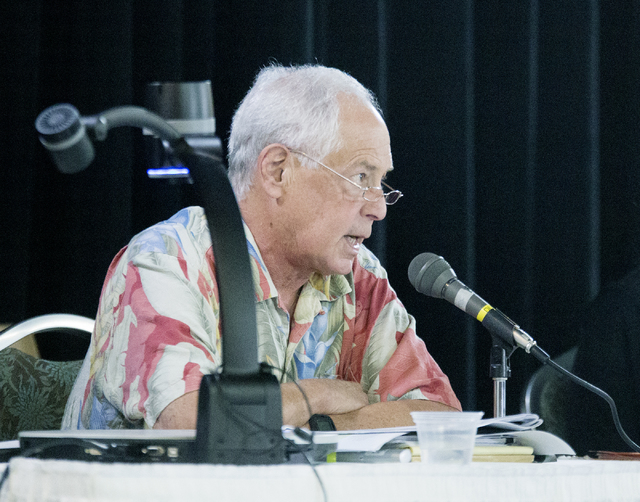Riki May Amano, hearings officer for the Thirty Meter Telescope’s contested case, denied a request Friday to put the process on hold following a recent ruling on the project’s sublease.
On Thursday, Hilo Circuit Court Judge Greg Nakamura ruled verbally that project opponents also had a right to a contested case for the lease contract.
That’s separate from the ongoing hearing for the telescope’s land use permit. A written ruling is pending.
“I haven’t seen a written briefing,” Amano, a retired judge, said in a response to a request to stay the hearing from Lanny Sinkin, who represents the Temple of Lono. She said the request was premature.
“I don’t have a basis to stay. I can’t do that and I’m not going to do that.”
Yuklin Aluli, an attorney for KAHEA, another contested case participant, said the recent ruling raises other procedural questions.
“So where we’re going is: Where is the cart and where is the horse?” she said.
“… Does the sublease come before the permit? That is a dilemma that I think the hearings officer is going to have to confront.”
Amano said people might be mixing “apples and oranges,” and that the review process for the conservation district land use permit and sublease likely would be handled separately. It’s possible there could be another contested case for the sublease, she said.
The sublease is between the University of Hawaii at Hilo, which holds a master lease for much of the mountain, and TMT International Observatory. The state Board of Land and Natural Resources must consent to the agreement since the mountain is state land.
Some asserted Friday that TIO no longer has a sublease and should be dismissed from the hearing since it wouldn’t have a property interest.
Those who were at the courtroom Thursday or familiar with the ruling said Nakamura vacated the Land Board’s consent to the agreement. E. Kalani Flores filed an appeal of the board’s decision after he was denied a contested case in 2014.
At the time, the state said it was a matter of internal management not subject to the quasi-judicial hearings.
Amano said she allowed TIO to participate for other reasons, including that its involvement would assist her as the decision maker. She provided the same reason for allowing the participation of opponents of the $1.4 billion project and other parties.
The ongoing hearing is the result of a 2015 state Supreme Court decision that also addressed violations of due process. The high court ruled the Land Board erred by voting in favor of the land use permit before the initial contested case occurred in 2011.
TIO needs a land use permit and sublease in order to build.
That original contested case, which involved seven days of hearings, resulted in a favorable report for the project.
Supporters say TMT will see more than 13 billion light years away and keep Hawaii at the forefront of astronomy.
Opponents say it will desecrate sacred ground and harm the environment on top of Hawaii’s tallest mountain.
So far, 17 days of hearings have occurred in the current contested case since witness testimony started in October. Dates are scheduled through January at the Grand Naniloa Hotel in Hilo.
TIO called David Callies, a land use law professor, as its first witness Friday.
He testified that the “public trust doctrine” doesn’t require “pristine and absolute preservation,” but rather a balance of uses.
Callies said the doctrine mostly involves water resources and doesn’t apply to Mauna Kea.
During cross-examination, project opponents pointed out that his view conflicts with parts of the concurring opinion in the 2015 Supreme Court appeal.
Mauna Kea was selected as the site for the 180-foot-tall observatory in 2009.
Thirteen telescopes are currently on the mountain. Plans are being made to remove up to three.
The ongoing contested case involves about two dozen parties, including several who protested construction of the telescope prior to the Supreme Court’s ruling.
The initial hearing involved six petitioners and UH, the permit applicant.
A TIO board member said last month that the organization intends to resume construction either on Mauna Kea or the Canary Islands, its alternate site, in April 2018.
The telescope organization’s partners are Caltech, University of California, Association of Canadian Universities for Research in Astronomy and national institutes in Japan, China and India.
Email Tom Callis at tcallis@hawaiitribune-herald.com.






